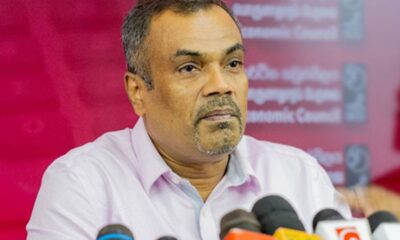FEATURES
Media ‘regulation’ is people’s business not Government’s
Published
2 years agoon
By
editor
Except in Opposition political party leaderships, there is not much interest in the ‘Broadcasting Regulatory Commission Act’ the Government plans to present for parliamentary approval. Most vociferous media activists and media organisations are not very conspicuous in protests against this piece of law that reads terribly nasty on democratic life of people and society. In summary, the Act would provide the “commission” the power to act against any broadcaster through its “investigation committee” on its own initiative or on a complaint that claims violation of the act itself, violation of the code of ethics prepared under this Act, violation of conditions laid in the license and in anything that threatens “national security, national economy and ethno-religious amity.”
To consent to these clauses, one should first know what the “code of ethics” contain, what conditions are laid in the license and most importantly definitions and demarcations of “national security.” There can be no justification also in keeping anything labelled as “national economy” outside the scrutiny of the people. Media therefore should have freedom to review, critique and report any protest against economic policy of the Government. Ethno-religious amity in present day Sri Lanka can be anything the law enforcement authorities would wish to understand as, and interpret as they interpret ICCPR provisions. Thus to have them with no clear and precise definitions in the Act would leave massive discretionary space with the authorities in applying the Act as they wish.
That noted with heavy resentment, more disturbing is how the Opposition in parliament avoids the question whether “broadcasting” should be regulated or not. Major concerns raised by Opposition ranks are about provisions of this Act, and not on “regulating broadcasting”. On what was berated in parliament by some Opposition MPs on this proposed regulatory commission, it is quite evident they know nothing about broadcasting and digital frequencies.
Digital frequencies
Quite different to “print media”, all broadcasting that includes telecasting, is solely dependent on “digital frequencies”. It is therefore important to know the difference between “printing paper” used in print media and “digital frequencies” used in broadcasting. In print media, everything from the whole establishment, editorial resources, printing and printing paper to distribution and sales is owned and managed by the investor(s) with the exclusive right to decide what type of a newspaper s/he would publish. The investor(s) also has the right to decide “editorial policy” of his or her newspaper.
Newspapers nevertheless have to be within accepted journalistic ethics and within the law of the land. For instance, when “criminal defamation law” was in force, newspapers had to abide by that law, while they had the freedom to campaign against it. They have the right to decide whatever political party they would wish to support or any social issue they would stand for. But they cannot for instance, contribute to ethno-religious hatred and divisions in their newspapers. That being the theoretical and legal position, what is practised in this Sinhala-Buddhist Sri Lanka is quite the opposite.
In theory, that freedom of a newspaper owner is not allowed for broadcasters. Fundamental reason being “printing paper” used as conveyor of news and information in print media is privately owned, while “digital frequencies” are publicly owned. They are neither owned by the “State” nor can they be sold. The State is only the “custodian” of frequencies on behalf of People. The Government as the political leadership that manages the State becomes decision makers in how frequencies could be used for public good and benefit. It is for that reason the Telecommunication Regulatory Commission (TRC) was legally established.
Yet, the TRC cannot sell licenses outright for use of “permitted frequencies” or issue on long-term lease. Nor can licenses be transferred, leased or sold to others by license holders. Licenses issued therefore have to be slapped with “terms and conditions” on use of the license and on conditions for broadcasting. As property of the people, everything about licenses including conditions, should be made public no sooner they are issued.
Once again this being Sri Lanka, nothing regarding issuing of frequencies and license holders are being published. Everything about issuing of frequencies are held secret by the TRC itself. Reality being, people nor the parliament is aware how many licenses have been issued for what frequency bundles, who holds them and on what conditions. Thus broadcasters have come to treat frequencies as owned by them and use them as they wish. This has led to a pathetic breakdown of rights and ethics within media itself, including the State owned.
As with every State owned entity, State owned media institutions are treated as political property of the government in power. Neither the minister in charge nor the personnel placed for management of State owned media know, frequencies in use are public property and they are bound to respect social impartiality and independence of broadcasting.
All private broadcasting owned by the filthy rich in this nauseatingly corrupt free market economy, are far worse than even the State. No private broadcaster allows his/her employees the fundamental right of forming a trade union and becoming a member of a trade union as guaranteed under Article 14.1(d) and ILO Conventions 87 and 98 ratified by the GoSL. Worst is the role of the Labour Department that behaves as if they are not aware of such violations of fundamental rights.
Slavish mentality
To make everything bad in media far worse, no media organisation, no media activist group demands the right to form trade unions and be members of a trade union of their choice. This timid acceptance of a grave suppression of rights, has turned media personnel into caged parakeets of colour. They are definitely not aware they are also bound by social responsibility in using frequencies owned by the people. Instead they believe their role is to serve the owner of the media company and may be achieve some popularity as a “screen face.” This slavish mentality especially in electronic media has denied professionalism in our media.
Media workers with no professional ethics sitting in front of cameras and microphones owned by private dealers cannot in any society contribute to social awareness and to decent entertainment with aesthetic and educational value. The result is quite evident. All “stations” compete with each other in broadcasting cheap and primitive programs; on astrology, feudal traditions and primitive values, bull fights like political brawls, fancy imitations of reality shows and the like with racist campaigns in between. Over decades of such broadcasting has left a selfish society with warped attitudes and devalued mentalities. In brief, media, especially the broadcasting media that is exceptionally penetrating is part responsible for the political and social rut this country is in.
That is ample reason for “regulating media”. Especially “content” regulation in Sri Lanka. Regulating does not mean “controlling, suppressing or throttling dissent.” It only means laying down specially demarcated areas the media, especially the broadcasting media should be cautious in handling “content” with responsibility. Lest they trespass forbidden ground as ethno-religious frictions, ignore or being negative towards marginalised and vulnerable social groups, social ethics and such.
In the UK and in France with far more advanced societies not only economically but culturally too, “regulating media” is in practice. In France, even commercial advertising comes under strict regulation with media owners required to publish their charges; “global price of advertising campaigns and the unitary price charged for each advertising space.” Copyright regulation is another with provisions for far more regional access allowed within the EU.
In the UK to quote Article XIX, “The print media is entirely self-regulating in the United Kingdom and operates free of any specific statutory rules. The profession has established the Press Complaints Commission on its own initiative, and this body has developed a code against which to measure journalistic standards. For the broadcast media, two broadcasting acts set out broad categories of material which should be covered by codes of conduct but leave detailed elaboration of these categories to regulatory bodies. These acts provide for the establishment of various independent regulatory bodies which undertake a variety of roles visà-vis broadcasters, including monitoring and applying the codes.” (Article XIX – Media Regulation in the United Kingdom)
Here lies the difference. Deciding parameters for media regulation is not the responsibility of the Government and the State. If the Government and the State is allowed to decide “regulation of media” as they wish, the important active presence of the media as social “Watchdog” over governance would be completely lost. Why “regulation” of media is necessary is to guarantee its independence in playing such a role.
Moreover, as frequency owners the public has the right to decide how frequencies should be used by those who obtain a license for broadcasting. Conditions and restrictions relevant for monitoring and regulating especially broadcast media has to be therefore agreed upon in a healthy social discourse. That should be the ownership all media activists and organisations must work for, instead of demanding amendments to what the Government has proposed in draft form. What it means in short is, the proposed Act for establishing a “Broadcasting Regulatory Commission” should be rejected in whole with media activists and organisations taking over the responsibility of drafting a new “media regulatory” statute through social dialogue including all social partners, accepting the fact digital frequencies are owned by the people, and therefore have to be “leased” in an open process.
– Kusal Perera
(ft.lk)
You may like
-


Monara TV closes down as Swarnavahini too grapples with crisis
-


Pvt. secretary of late minister injured in shooting
-


Young woman brutally murdered in Kuruwita
-
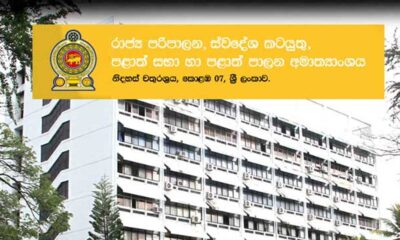

Revised pensions to be granted from this month
-
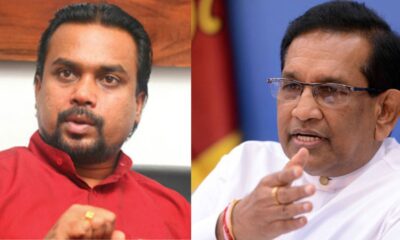

Rajitha & Wimal fail to appear before CIABOC
-
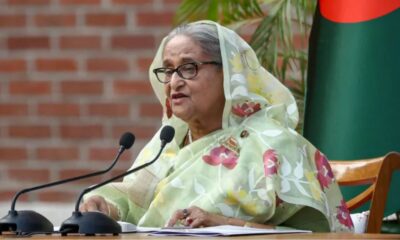

Bangladesh ex-PM Hasina gets 6-month prison sentence
FEATURES
Asweddumized fields and sizzling kottu roti: New words from Sri Lanka
Published
7 days agoon
June 26, 2025By
editor
In a letter dated 7 October 1971 and sent from Panadura, Ceylon, OED contributor Pearl Cooray wrote to then Chief Editor Robert Burchfield: ‘I have looked up references for the word asweddumize and have succeeded to a certain extent. The Sinhala word aswedduma means “land recently converted into a paddy field”, and the Anglicized word asweddumize means to prepare a field for sowing paddy’. Cooray was a Sri Lankan academic who visited Burchfield in Oxford earlier in 1971, and upon returning to her country and her position in the Dictionary Department of the University of Ceylon, briefly corresponded with the OED, sending the above quoted letter as well as a selection of Sri Lankan newspapers and magazines for the reading programme for the OED Supplements that were in preparation at the time. Her suggestion for asweddumize would have been too late for the word to be considered for Volume I of the Supplements, so Burchfield wrote the word and definition on a paper slip, the main means by which words were tracked until the 2010s, and filed it alongside an earlier slip from July 1970 with the same suggestion from another Sri Lankan contributor, D. N. Ponnamperuma.
Nothing further is found about asweddumize in the OED’s files until 1986, when botanist D. J. Mabberley, a regular consultant for the Supplement, sent in a quotation slip for the word, which he would have encountered during the time he spent at a university in Sri Lanka. A decade later, another slip records the decision made not to draft an entry for asweddumize due to lack of evidence. ‘Omit (sadly)’was the responsible editor’s regretful note on the slip.
Almost thirty years later, this sad omission has finally been rectified, with the addition of asweddumize to the OED as part of this update. Current OED Sri Lankan English consultant Rochana Jayasinghe’s research on Pearl Cooray and her contributions to the Supplement helped put asweddumize back on the OED’s radar, and now that the dictionary’s editors have wider access to historical and contemporary Sri Lankan sources than their counterparts in the 1970s and 80s, it was possible to find sufficient evidence for the word, including a first quotation from as far back as 1857.
Joining asweddumize among this batch of new words are other borrowings from Sinhala, the Indo-Aryan language primarily spoken by the Sinhalese, the largest ethnic group in Sri Lanka. Mallung (first attested 1893) is lightly cooked, shredded (often leafy green) vegetables mixed with fresh grated coconut, chilli, and other spices, served as a side dish, salad, or condiment as part of a typical Sri Lankan meal, while kiribath (1886) is a Sri Lankan dish made with rice cooked in coconut milk and formed into a block, typically sliced into diamond-shaped pieces and served with various types of onion relish or sweetened with jaggery. Kiribath is traditionally eaten at special occasions such as Avurudu (1881), the first day of the Sinhala and Hindu New Year, occurring on the spring equinox (usually falling around 14 April), marked by a period of celebration typically lasting for seven to ten days.
Other Sri Lankan English words in this update originate both in Sinhala and another widely spoken language on the island, Tamil. Kottu roti (1991) is a Sri Lankan dish consisting of pieces of roti, meat, and vegetables, mixed with spices and curry sauce, and chopped by cleavers as they are cooked on a griddle. It is typically associated with the distinctive sound of the cleavers hitting the griddle as it is prepared by roadside vendors, and its name combines the Tamil word kottu ‘chopped’ with the Sinhala word roṭi ‘bread’. Partly a borrowing from Sinhala and partly a borrowing from Tamil, watalappam (1956) is a custard made from coconut milk (or sometimes condensed milk), cashew nuts, eggs, and spices such as cardamom and cloves, sweetened with jaggery and traditionally eaten by Sri Lankan Muslims during celebrations marking the end of Ramadan.
Sri Lankan music is represented by the words baila (1973) and papare (2006). Baila, a loan word from Portuguese, refers to an uptempo style of popular music originating in Sri Lanka which combines influences from both Africa and Europe, typically played in 6-8 time, with a syncopated rhythm, as well as to the style of dance performed to this music. Often associated with weddings and other celebrations, types of baila music are also popular in Goa and in the city of Mangaluru, on India’s west coast. Papare, on the other hand, is a genre of Sri Lankan music usually played at cricket and other sports matches, characterized by lively rhythms and typically featuring instrumentation of trumpet, saxophone, trombone, and snare and bass drums.
Apart from adding new Sri Lankan English words, OED editors have also revised a number of existing Sri Lankan English entries in the dictionary. Both these new and revised entries have been given transcriptions and audio pronunciations based on a new pronunciation model for Sri Lankan English, which is explained in more detail in this article. These enhancements to the OED’s coverage of Sri Lankan English help provide a more complete picture of how the language is used islandwide.
Full list of World English additions and revisions in the OED June 2025 update
(oed.com)
FEATURES
Dog-sized dinosaur that ran around feet of giants discovered
Published
1 week agoon
June 25, 2025By
editor
The full name of the new species is Enigmacursor mollyborthwickae dinosaur
A labrador-sized dinosaur was wrongly categorised when it was found and is actually a new species, scientists have discovered.
Its new name is Enigmacursor – meaning puzzling runner – and it lived about 150 million years ago, running around the feet of famous giants like the Stegosaurus.
It was originally classified as a Nanosaurus but scientists now conclude it is a different animal.
On Thursday it will become the first new dinosaur to go on display at the Natural History Museum (NHM) in London since 2014.
BBC News went behind the scenes to see the dinosaur before it will be revealed to the public.
The discovery promises to shed light on the evolutionary history that saw early small dinosaurs become very large and “bizarre” animals, according to Professor Paul Barrett, a palaeontologist at the museum.
When we visit, the designer of a special glass display case for the Enigmacursor is making last-minute checks.
The dinosaur’s new home is a balcony in the museum’s impressive Earth Hall. Below it is Steph the Stegosaurus who also lived in the Morrison Formation in the Western United States.
Enigmacursor is tiny by comparison. At 64 cm tall and 180 cm long it is about the height of a labrador, but with much bigger feet and a tail that was “probably longer than the rest of the dinosaur,” says Professor Susanna Maidment.

The Enigmacursor was a small dinosaur that lived alongside some of the biggest known
“It also had a relatively small head, so it was probably not the brightest,” she adds, adding that it was probably a teenager when it died.
With the fossilised remains of its bones in their hands, conservators Lu Allington-Jones and Kieran Miles expertly assemble the skeleton on to a metal frame.
“I don’t want to damage it at this stage before its revealed to everybody,” says Ms Allington-Jones, head of conservation.

Conservators Lu Allington-Jones and Kieran Miles assembled the dinosaur onto a frame for display
“Here you can see the solid dense hips showing you it was a fast-running dinosaur. But the front arms are much smaller and off the ground – perhaps it used them to shovel plants in its mouth with hands,” says Mr Miles.
It was clues in the bones that led scientists at NHM to conclude the creature was a new species.
“When we’re trying to identify if something is a new species, we’re looking for small differences with all of the other closely-related dinosaurs. The leg bones are really important in this one,” says Prof Maidment, holding the right hind limb of the Enigmacursor.
When the dinosaur was donated to the museum it was named Nanosaurus, like many other small dinosaurs named since the 1870s.
But the scientists suspected that categorisation was false.
To find out more, they travelled to the United States with scans of the skeleton and detailed photographs to see the original Nanosaurus that is considered the archtype specimen.
“But it didn’t have any bones. It’s just a rock with some impressions of bone in it. It could be any number of dinosaurs,” Professor Maidment said.

Susanna Maidment travelled to the US to look at the original Nanosaurus dinosaur
In contrast, the NHM’s specimen was a sophisticated and near-to-complete skeleton with unique features including its leg bones.
Untangling this mystery around the names and categorisation is essential, the palaeontologists say.
“It’s absolutely foundational to our work to understand how many species we actually have. If we’ve got that wrong, everything else falls apart,” says Prof Maidment.
The scientists have now formally erased the whole category of Nanosaurus.
They believe that other small dinosaur specimens from this period are probably also distinct species.
The discovery should help the scientists understand the diversity of dinosaurs in the Late Jurassic period.
Smaller dinosaurs are “very close to the origins of the large groups of dinosaurs that become much more prominent later on,” says Prof Barrett.
“Specimens like this help fill in some of those gaps in our knowledge, showing us how those changes occur gradually over time,” he adds.
Looking at these early creatures helps them identify “the pressures that finally led to the evolution of their more bizarre, gigantic descendants,” says Prof Barrett.

The fossilised remains are the most complete of any in the world for early small dinosaurs
The scientists are excited to have such a rare complete skeleton of a small dinosaur.
Traditionally, big dinosaur bones have been the biggest prize, so there has been less interest in digging out smaller fossils.
“When you’re looking for those very big dinosaurs, sometimes it’s easy to overlook the smaller ones living alongside them. But now I hope people will keep their eyes close to the ground looking for these little ones,” says Prof Barrett.
The findings about Enigmacursor mollyborthwickae are published in the journal Royal Society Open Science.
– Georgina Rannard
Science correspondent
(BBC News)
FEATURES
JVP-NPP should learn difference between “marine research” & “surveillance”
Published
2 weeks agoon
June 21, 2025By
editor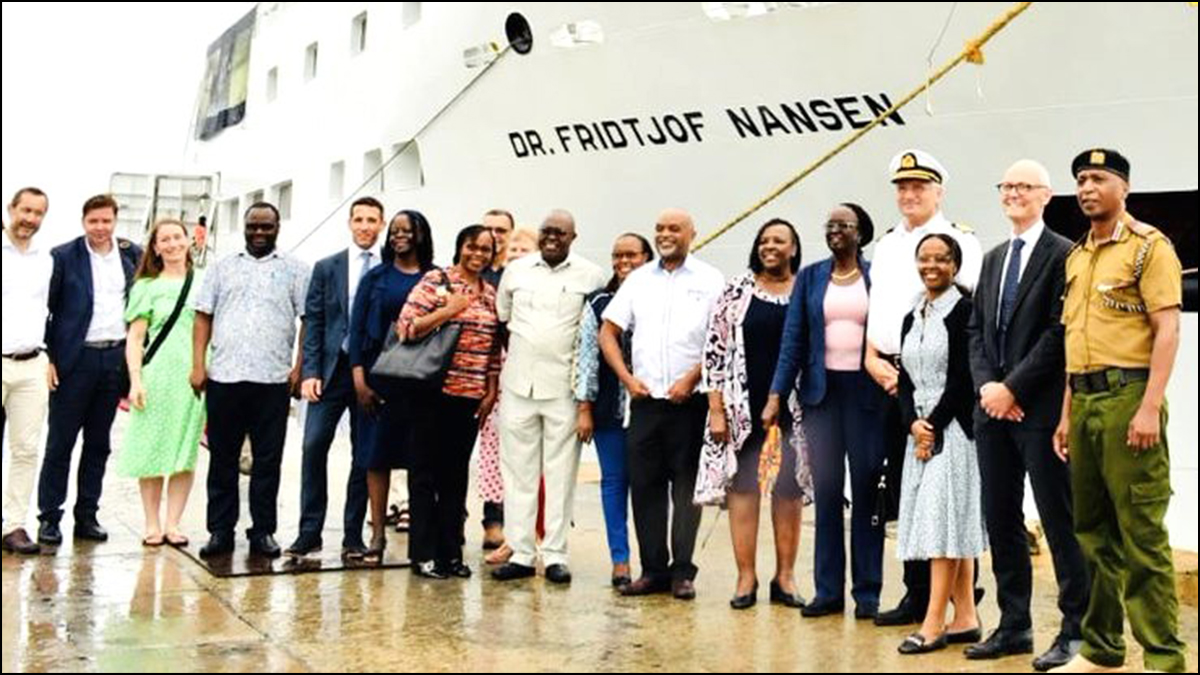
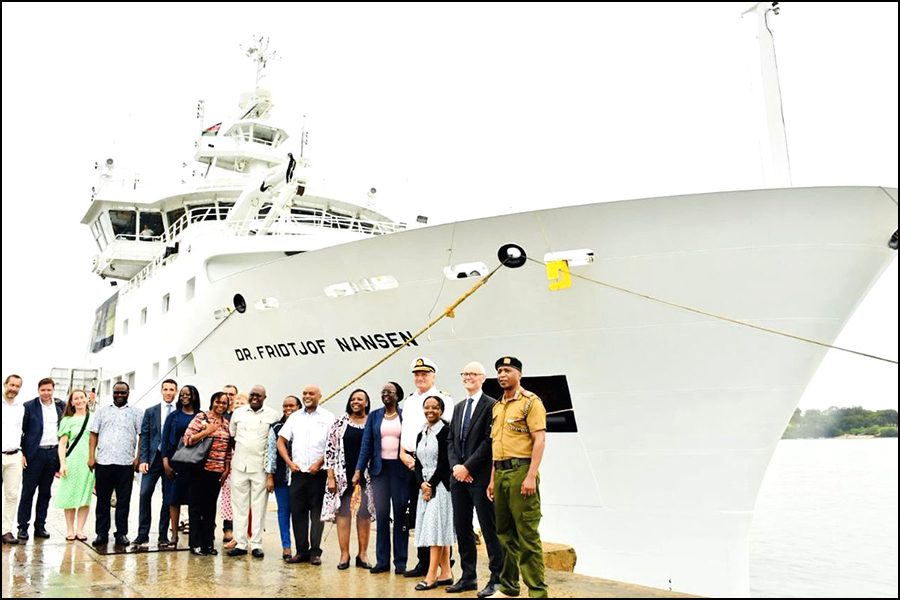
There’s now an apparent stand-off between the UN FAO and the Foreign Affairs Minister Vijitha Herath on the request made by the FAO to have permission for the UN flagged “Dr. Fridtjof Nansen” marine research vessel to enter Sri Lankan waters. Minister Herath is on record saying the request would have to wait till the Committee on Standard Operating Procedures (SOP) for foreign research vessels appointed by him and perhaps chaired by him too, complete their task in formulating the SOP. It was revealed, the SOP Committee is yet to be convened for the first time. With “Dr. Fridtjof Nansen” marine research vessel waiting in Mauritius to set sail to Sri Lanka, numerous discussions the UN had with the Foreign Ministry (FM) since April has only reached the point, where the SL FM agreed to allow the ship to pick Bangladeshi “Scientists” from Colombo, but not get involved in any research in our waters.
res (SOP) for foreign research vessels appointed by him and perhaps chaired by him too, complete their task in formulating the SOP. It was revealed, the SOP Committee is yet to be convened for the first time. With “Dr. Fridtjof Nansen” marine research vessel waiting in Mauritius to set sail to Sri Lanka, numerous discussions the UN had with the Foreign Ministry (FM) since April has only reached the point, where the SL FM agreed to allow the ship to pick Bangladeshi “Scientists” from Colombo, but not get involved in any research in our waters.
What’s this whole calamity over a FAO marine research ship requesting permission to enter Sri Lankan waters? Someone somewhere at the helm of the Foreign Ministry, or the Foreign Minister himself has wholly misinterpreted the issue of country owned research ships visiting Sri Lanka and the moratorium that was imposed by President Wickramasinghe barring foreign research ships.
Sri Lanka was pressured by India and the US to curtail if not stop Chinese research ships from docking in our ports in the past few years. Special concerns were over the 02 research ships “Yuan Wang 5” that docked at Hambantota in early 2022 during Gotabhaya’s presidency and “Shi Yan 6” in October 2023 at the Colombo port during Wickramasinghe’s presidency. It was said, these 02 research ships had the capacity for surveillance and monitoring the region. Under pressure especially from New Delhi, President Wickramasinghe decided to impose a one year moratorium on foreign research ships visiting Sri Lanka, effective from early January 2024.
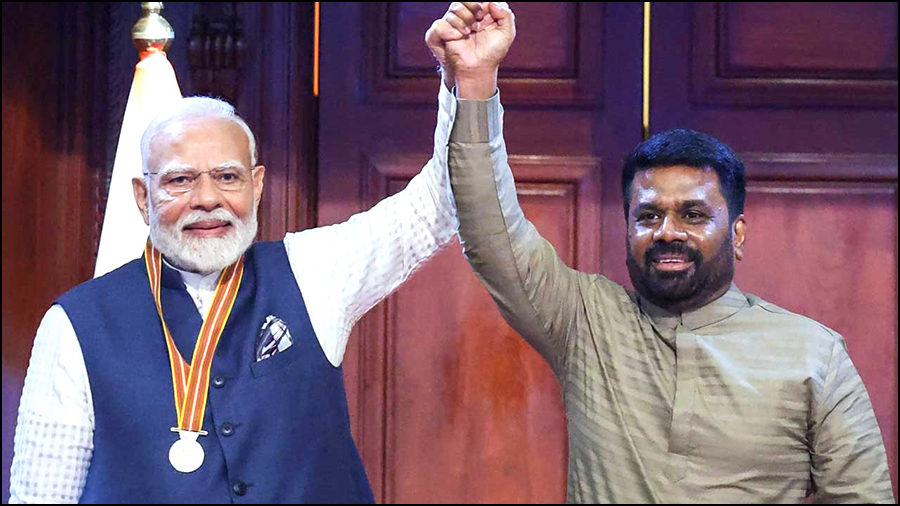
The Wickramasinghe moratorium came to its end on 05 January 2025, as the JVP-NPP government did not extend it further. Reason to allow the moratorium to lapse in January, may have been on a strictly confidential agreement reached to have a separate bi-lateral agreement on defence, during President Anura Kumara’s maiden official visit to India in mid-December 2024. Defence had been an issue discussed with Indian authorities during President Anura Kumara’s Indian visit, wrote Dr. Samatha Mallempati of “Indian Council of World Affairs” in May 2025. A defence MoU would thus make the moratorium irrelevant thereafter. PM Modi was to visit Sri Lanka 04 months later in early April this year. One among the many MoUs the 02 governments signed during PM Modi’s visit was the first ever Memorandum of Understanding (MoU) on “defence co-operation”.
India began working on a defence strategy for Indian Ocean Region (IOR) since the conclusion of Sri Lanka’s North-East civil war in 2009. New Delhi was very much concerned over President Rajapaksa’s post-war association with not only China, but with Pakistan too. Both with long time hostile border disputes with India. Contributing an article to “Stimson.org” on Pakistan-Sri Lanka relations in March 2021, two researchers on South & East Asian geo-politics Riaz Khokhar and Asma Khalid wrote, “In 2016, Pakistan signed a defense agreement with Sri Lanka to provide Colombo with eight JF-17 fighter aircrafts. Pakistani and Sri Lankan armies and naval forces have also regularly interacted through port calls, military and naval training and exercises, and defense workshops and seminars. In the recent high-level visit to Colombo, the Pakistani premier offered a USD $50 million credit line to Sri Lanka to further enhance defense and security partnerships.”
South Asian geo-politics did have new developments with post-war Sri Lanka compromising its economic needs with defence and national security in challenging the Tamil Diaspora canvassed US-Euro resolutions at UNHRC Sessions. Rajapaksa government was required to accept independent international investigations on war crimes and crimes against humanity, with many top military officers named. Pakistan stood with Sri Lanka, voting against all such resolutions at every UNHRC Session, while the Rajapaksa regime joined the Belt and Road Initiative of China, and was financially supported by China. Financial support that led to the popular adage “Sri Lankan type Chinese debt trap”.
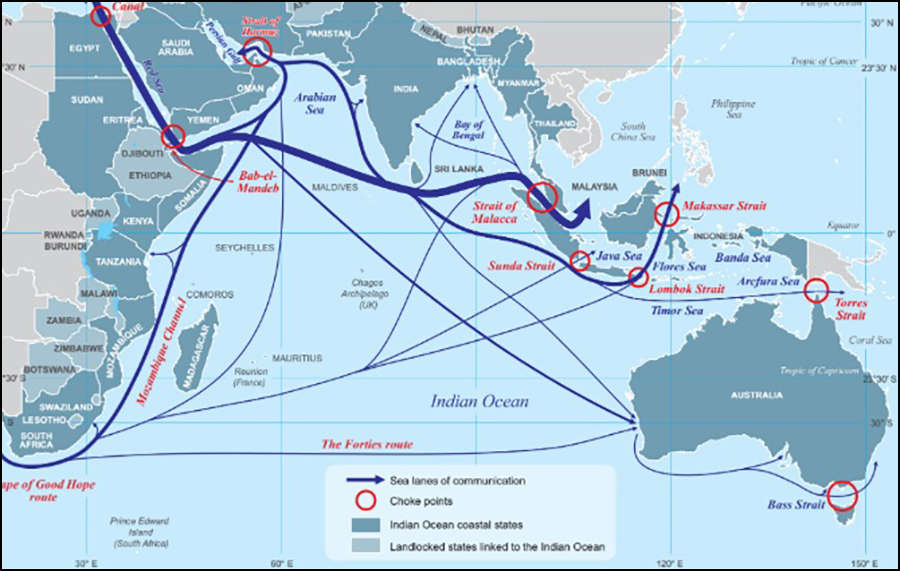
India has since been working towards establishing its dominance in the IOR keeping Sri Lanka as its focal point. Highlighting the geo-political importance of Sri Lanka, Dr. Samatha Mallempati wrote, “Since the region accounts for fifty percent of world maritime trade and seventy percent of global trade in oil and gas, there is a greater need to safeguard the sea lanes of communication. The increasing strategic significance of island states in the region therefore assumed importance. The island states such as Sri Lanka is looking to play a much bigger role by leveraging their geographical location.”
The perception in New Delhi that Sri Lanka is leveraging its geographical location to define geo-politics in the IOR, was what paved for the MoU on defence co-operation India signed with Sri Lanka, that for 05 years would provide India adequate space to influence Sri Lankan geo-politics in its favour. But the fact is, all these agreements and treaties are about IOR peace and stability and the influence “foreign countries” may have in it. The Sri Lankan moratorium was also about research ships of foreign countries, docking in our ports.
How would the UN flagged marine research ship “Dr. Fridtjof Nansen” interfere in IOR stability and peace? The request to FAO for marine research in our waters had gone from the SL Government, never mind who led the government. FAO is focussed on sustainable fisheries management and this modern, fully equipped ship for marine research is used mainly in African and Indian Ocean waters in collaboration with NORAD to support developing countries with research based fisheries management. That perhaps was the only reason for the previous government to request the FAO to visit Sri Lankan waters. Mind you, that request for FAO to undertake marine research in our waters, went out while the moratorium on foreign research ships was fully effective.
Whatever the bureaucracy at the FM says, a seasoned politician like Vijitha Herath who had been in parliament for 25 years to date from year 2000, should know the difference between this UN flagged marine research ship and other research ships owned by individual countries. Anything flagged as “UN” is common property of 195 sovereign nation States who are UN members. This ignorance therefore very clearly exhibits the JVP/NPP leadership as the most intellectually timid leadership to have been voted to power since 1948 independence.
Kusal Perera
20 June, 2025

Monara TV closes down as Swarnavahini too grapples with crisis

Pvt. secretary of late minister injured in shooting








